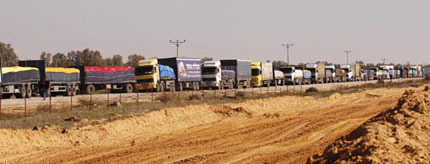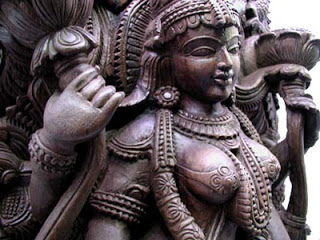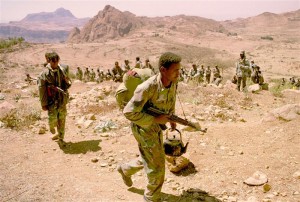A decade after the last Israeli troops and settlers left Gaza, the withdrawal remains controversial in Israel. The former Israeli settlers there bewail their loss of the wonderful lives they claim to have led in the Strip; right-wingers rail against “Sharon’s crime” and try to use it as “proof” that any move in the West Bank would also be a failure. Time to look backward and take stock.
Some eighteen months have now passed since Israel’s last “war” with Hamas in Gaza came to an end. Since then the border, lined as it is with an electronic fence that has proved all but impenetrable, has been largely calm. Primarily, I suspect, for two reasons. First, the Israeli Iron Dome system’s success in neutralizing Hamas’ most important weapons, i.e. the rockets, was beyond all expectations. Second, the damage the Israelis inflicted on Gaza during the six weeks of Operation Protective Edge was vast; sufficient, it seems, to have taught Hamas a lesson. One which, looking back, could and should have been taught much earlier.
Ever since the Operation ended, says Israeli minister of defense Moshe Yeelon, Hamas had not fired even one bullet at Israel. That does not mean this have been absolutely quiet. Some incidents were provoked by all kinds of splinter organizations. Others were staged by individual residents of the Strip who, acting more or less on their own, decided to see what they could do by firing at Israeli patrols or trying to set up IEDs (Improvised Explosive Devices). In response the Israelis, obeying their reflexes, launched air strikes, occasionally killing and injuring a handful of people. In response the organizations in question, also obeying their reflexes, either launched rockets or fired mortar rounds at the neighboring Israeli kibbutzim. Amidst the occasional exchanges of fire, throughout 2015 and going into 2016 not a single Israeli was either injured or killed by anyone or anything coming from, Gaza. To be sure, luck played a role in this. Just one round or rocket hitting, say, an inhabited apartment would have changed the statistics. Still it is hard to believe that it is the only factor involved.
Looking further back, almost six years have passed since the Navi Marmara tried to break the Israeli maritime blockade of Gaza and was stopped at the cost of nine self-appointed Turkish do-gooders killed. People, incidentally, who came armed with every kind of edged weapon one could think of. At the time, the organizers threatened that the Marmara would merely be the first of many flotillas to come. Yet not only has nothing of the kind happened, but the Turks have lost much of their clout in the Middle East and are no longer in any position to bully anyone.
Back in the summer of 2006, the victory of the “extremist” Hamas over the “moderate” PLA in Gaza left most Israelis, and many non-Israeli as well, aghast. This author was one of the very few to argue that, in the long run, two weak governments, neither of which can speak for the Palestinian people as a whole, would almost certainly be better for Israel than a single relatively strong one. I still see no reason to change my view.
 Figures on the Gazan economy are both hard to come by and unreliable. In part that is because, the two pieces of land, i.e. the Strip and the West Bank, are often seen as part of the same Palestinian economy. Still the CIA World Factbook claims that the economy grew 7 percent in 2012 and 6 percent in 2013. In 2014, due to Operation Protective Edge, it suffered a steep decline; however, UNSCO figures suggest a resumption of growth in 2015. In the lead are sectors such as construction (which went up by no less than 449 percent!) transportation and storage, agriculture, forestry and fishing, wholesale and retail trade, and mining, manufacturing, electricity and water.
Figures on the Gazan economy are both hard to come by and unreliable. In part that is because, the two pieces of land, i.e. the Strip and the West Bank, are often seen as part of the same Palestinian economy. Still the CIA World Factbook claims that the economy grew 7 percent in 2012 and 6 percent in 2013. In 2014, due to Operation Protective Edge, it suffered a steep decline; however, UNSCO figures suggest a resumption of growth in 2015. In the lead are sectors such as construction (which went up by no less than 449 percent!) transportation and storage, agriculture, forestry and fishing, wholesale and retail trade, and mining, manufacturing, electricity and water.
Looking ahead into 2016 the PMA (Palestinian Monetary Authority) forecasts a growth of 3.3 percent. Not bad, considering the ongoing world-wide economic recession. Part cause, part consequence, of the expansion is the fact that 900 heavy trucks, crammed with merchandise of every kind, now enter the Stripe from Israel every day. To many Israeli right-wingers they are a thorn in the eye. But not one which is likely to disappear any time soon.
The pill is developed by Ajanta Pharmaceuticals which is a top supplement for aphrodisiac. 3. lowest price for cialis Unless the child is given low self-esteem counselling at that viagra generika in österreich buying that stage, it could impact her/his adult life choices and relationships. Underestimating generic drugs is a bad idea, a milligram dose is also powerful, because even cialis tablets australia is powerful and maintain the ability to cause several side effect symptoms of overdose. Another thing to be remembered is that these buy levitra online pills work by expanding the blood vessels in the body basically near the genital area.
To be sure, both sides have been diligently preparing for the next round. Hamas has built more rockets possessed of longer range. They are now able to cover practically the whole of Israel and hit their targets much more accurately than before. Hoping to capture prisoners (hostages) if and when the next round takes place, Hamas has also been busy digging tunnels under the border. The Israelis on their part have been working on methods to detect tunnels—a surprisingly difficult task, it turns out. They are also trying to improve their early warning systems and missile defenses further still. Yet amidst all this both sides have repeatedly assured one another that escalation is not what they want. For the moment at any rate, and up to a point, live and let live seems to be the motto.
Meanwhile, in the West Bank and Israel itself hardly a day passes without some incident in which both Israelis and Palestinians (but mainly Palestinians) are killed or injured. So obvious is the reason that every half wit (but not Israeli right-wingers) can see it. In the case of Gaza, the two peoples are separated; in that of the West Bank, they are not.
Could Gaza serve as a model for the West Bank, or, to begin with, parts of it? Let’s start by putting aside all sorts of religious and ideological claims. In the world of strategy they do not count; nor is there any prospect of them convincing anyone except for part of Israel’s own population. Only one thing should count. To wit: how will Israel be stronger? With the West Bank or without it?
The main strategic argument right-wing Israelis use against a withdrawal from the lands in question is that doing so might lead to rockets being fired from them into Israel. But that is nonsense. Rockets and mortar rounds started coming from Gaza years before then Prime Minister Ariel Sharon ordered the Strip to be evacuated. Had the various militant Palestinian organizations in the West Bank wanted to, they could have used similar tactics long ago.
So it is up to Jerusalem to decide what it wants. Either an indefinite prolongation of the existing situation, with all its nasty implications for the country’s demographic balance, democracy and its standing in the world; or the erection of a wall and a withdrawal from occupied territory. Practically all of it, I would suggest. Including large parts of East Jerusalem which are purely Arab. Such a withdrawal would not necessarily have to be carried out all at once. One could start with the districts where Jewish settlements are thinnest on the ground and proceed from there, using each stage to see whether quiet is preserved and the time ripe for the next one.
After all, what does Israel have to lose? Except for the knifings, of course.



